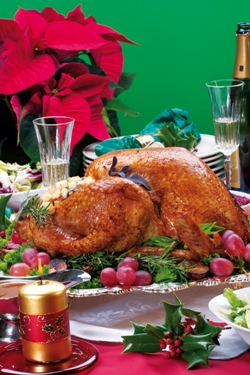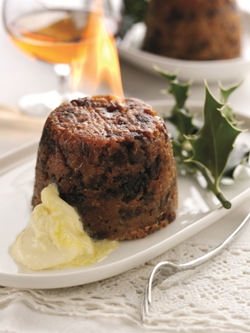Ten Small Steps to a Big Organic Christmas
Little choices can add up to make for a big change, so this Christmas the Soil Association has come up with ten ways for you to enjoy a festive period that is better for people, animals and the planet.
The choices we make over the festive season - about what goes on our plates, the presents we buy, what we wear and what we put on our skin - have far reaching consequences for our health, the health of our countryside, and the development of countries across the world.
Food for Thought
With 30% of an individual's carbon footprint made up of their food choices, food is the single most important, everyday way for people to reduce their own environmental impact.
Choosing the most climate-friendly food choices means supporting sustainable agriculture and buying organic, local and seasonal food.
Organic farms have 50% more wildlife, support more and better farming jobs, and cause less pollution. Organic farmers use natural processes such as energy from the sun to fix nitrogen in the soil, crop and livestock rotations, and natural predators for pest control.
Under organic standards there is a strong focus on animal welfare, which reduces the need for drug treatment.
Organic farming is generally a more energy efficient system of food production, mainly because it does not use inorganic nitrogen fertiliser, which is produced from petro-chemicals. If all UK farmland was converted to organic farming, at least 3.2 million tonnes of carbon would be taken up by the soil each year - the equivalent of taking nearly 1 million cars off the road.
Eating an organic diet on a budget is easy if you get creative in the kitchen and rethink your shopping list. A few top tips - eat less meat, buy dried goods in bulk, make a shopping list to avoid waste and sign up to an organic box scheme. The Soil Association website has lots of money saving tips and a membership gives you access to exclusive money saving deals from organic retailers.
Wear green this winter
Almost a quarter of all the world's insecticides and 10% of pesticides are sprayed on cotton, but with many high street retailers now stocking organic, it's easier than ever to go green.
Organic textiles are grown without the use of harmful pesticides or GMOs; promoting a healthier farm and environment. The Soil Association certifies to the Global Organic Textile Standards (GOTS), the international gold standard for organic textile processing.
The whole supply chain from field to final product is certified, and environmental and social standards apply throughout processing. There are now almost 3000 GOTS certified textile and garment businesses worldwide and the organic textiles sector saw a whopping 35% growth in sales for certified organic businesses in 2010.
Where you see the Soil Association logo you can be sure the textiles are planet friendly, promote better working conditions and high animal welfare, and are free from harmful chemicals.
Drink Organically
Opt for organic wine and not only will you be supporting a natural system of farming, you'll also be consuming less sulphur - >which appears to lessen the chances of a hangover.
If you're more of lager drinker, the average non-organic farmer is estimated to spray hops up to 14 times each year with an average of 15 pesticides. Avoid these by looking for the Soil Association logo and be sure your pint has been produced organically.
Organic spirits are available through specialist suppliers and some supermarkets. The main difference lies in the use of organic raw materials; non-organic vodka is made from grain produced in systems usually reliant upon multiple applications of pesticides and artificial fertilisers.
Dine Organically
Eating organically this Christmas means you can avoid consuming pesticide residues, GM ingredients or unnecessary food additives. Over 300 pesticides are routinely used in non-organic farming (the average Cox’s apple may be sprayed 16 times with over 30 different pesticides and chemicals before it is harvested), compared to only six allowed under Soil Association organic standards. Artificial fertilisers used in non-organic farming increase the water content of vegetables, which depresses their nutritional content.
Only 32 of the 300 food additives approved for use across the EU are permitted in organic food. Controversial additives like aspartame, tartrazine and hydrogenated fats which have been linked to health problems such as heart disease, migraines and hyperactivity, are banned in organic food. Choosing organic ingredients means you can relax and enjoy your Christmas meal knowing you aren't harming your body with unwanted extras.
Talk Turkey
Ten million turkeys are sold in the UK each year, and of these, 90% are reared intensively, spending their short 15 week lives in windowless, crowded, barren sheds. If you want to be sure that yours had been fed a healthy diet, had access to the outdoors and is not from a factory farm, then look out for the Soil Association logo, as no system of farming has higher levels of animal welfare standards.
Be a natural beauty
Your skin is the largest organ of your body and what you put on it can be absorbed in tiny amounts.
The impact from the daily cocktail of substances that we put on our skin is only just beginning to be understood and while one product may contain very small amounts of some of these ingredients, it is the cumulative effect of applying various products regularly that causes concern.
What's more, additives in toiletries can end up in the water systems and remain in the environment for some time.
Unfortunately, unlike organic food, there are no legal standards for organic beauty products. As a result, some companies choose to label a product as 'organic' even if it only contains 1% organic ingredients or if it contains potentially hazardous substances.
This is why we developed the Soil Association health and beauty standards, so you can look for the Soil Association symbol for your guarantee that the product has been checked and meets the strictest standards for organic purity and integrity.
Get your hands dirty
Over 29% of UK adults have never set foot on a farm. The Soil Association is working to change that. Visiting a farm helps people see how their food starts out and it demonstrates how we can choose to eat food that helps the environment rather than damages it.
The Soil Association has an extensive network of more than 150 farms across the UK who run special visits, open days and other public activities. New farms are joining all the time, and we have members who can show you everything from walled vegetable gardens to remote hill farms and even a vineyard.
If you're after something more hands on, why not learn some new skills as part of the Soil Association Organic Farm School, supported by the Daylesford Foundation. The courses cater to all levels and provide the opportunity to learn from organic farmers with personal experience - from a one-day basic introduction to more professional expertise - in bee-keeping, chicken keeping, vegetable growing, willow weaving, hedge laying or dry stone walling, and many others. They also make very good presents and if you’re a Soil Association member, you’ll save 25%.
Get to know your neighbours
Make it your New Year's resolution to join a buying group or Community Supported Agriculture (CSA) Project. By getting together in a group from your work place, neighbourhood, club or school, people can buy in bulk directly from farmers and receive fresh organic produce at a lower price, whilst farmers receive a secure market and fairer income. Many CSAs also enable and encourage people to get involved on the farm.
The Soil Association's CSA project evaluation has found that Community Supported Agriculture (CSA) has a significant effect on the life, health, skills, and general well-being of those involved, with a striking 70% of participants saying their overall quality of life has improved. The evaluation also found that CSA projects impact positively on the local community, benefit surrounding wildlife, encourage a diverse volunteer base, and provide important employment opportunities.
There are over 50 CSA projects operating in the UK now and an increasing number of organic buying groups, providing fresh, quality produce, including vegetables, fruit, cheese, milk, meat, eggs, bread and honey.
Avoid the Christmas Crush
Reconnect with the people who grow, make and supply your food by shopping at a local farmers' market or farm shop. Not only do you get to avoid the queues, you support the local economy too. Farmers' markets are springing up across the UK so there is likely to be one near you, with hundreds of choices for your Christmas meat, veg, puddings, cakes and pies. In addition to all the yummy organic food, farmers' markets are a great place to find handmade and unique Christmas gifts, which support the local economy.
The Soil Association, in partnership with the Mid Wales Food and Land Trust, is piloting farmers' markets in 14 schools across Wales and Shropshire. Producers travel just 14 and a half miles on average to sell their wares, children benefit from a hands-on educational experience and families get to discover great food on their doorstep.
Food for Life, not just for Christmas
Give a gift that will continue making a difference long after the decorations have been boxed away. The Soil Association is a charity and relies on its members to continue its work.
By giving the gift of membership, you'll be helping us continue our education programmes like the Organic Apprenticeship Scheme helping to share skills, knowledge and expertise with a new generation of farmer; community projects such as Community Supported Agriculture and campaigns like 'Not in my Banger' - all helping to secure a healthy, humane and resilient food, farming and land use.
You'll also be playing a part in safeguarding the future of organically and traditional farms by managing them in trust in perpetuity, organically and sustainably through the Land Trust scheme and supporting the next generation of farmers through our successful.
Your gift will include a welcome pack and membership card, entitling the recipient to year-round benefits including regular editions of their award winning magazine, Living Earth, fun and inspirational days out at events (free to members) discounts and special offers at organic outlets such as Planet Organic and much more.
A year's membership costs £24 a year, or £33 for joint.
For more details go to www.soilassociation.org
